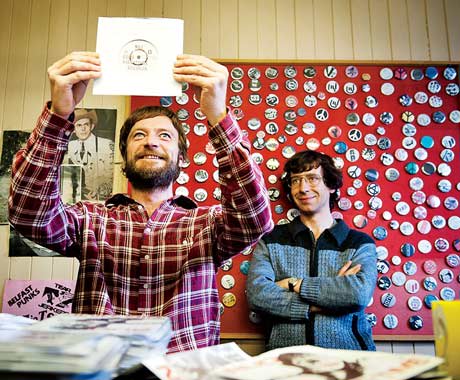In a lot of ways, Terri Hooley sounds a lot like you and I (you and I being the kind of people who read Exclaim!): an avid music fan with more than enough heart and soul to go around. While friends of his fell out of the rock'n'roll scene, Hooley kept at it, collecting records and hosting monthly DJ nights. The only difference is that while most of your friends probably moved on to other activities associated with adulthood, Hooley's friends picked up arms instead.
Set in Belfast during the bloody battles between Ireland's Protestant and Catholic working class of the 1970s, Good Vibrations tells the real life story of long-time music fan Terri Hooley (played by Richard Dormer), a socialist dreamer who happened to be at the right place at the right time. With no outlet for his creative pursuits and lacking his original core group of friends, he opens a record store on Belfast's most bombed out mile and names it Good Vibrations. His goal: to bring the two sides together again through the power of music.
Things don't work out exactly as planned, as most of his buddies seem more interested in 9mm handguns than 7-inch records. That's when Hooley discovers Belfast's underground punk scene. After being handed a flyer for a show at a local club, he realizes he has more in common with the rising subculture than he first imagined. Transformed by the blistering anti-authoritarian sounds of a few simple chords, Hooley sets out to record the best bands from Belfast's punk scene and bring light to an otherwise dark time.
Directed by relative newcomers Lisa Barros D'Sa and Glenn Leyburn (who previously worked together on 2009's Cherrybomb), the directorial team perfectly captures the rambunctious energy of the times, interspersing heavily edited news clips of Belfast's ongoing self-destruction among shots of Northern Ireland's decaying downtown to fully showcase the utter misery of its young inhabitants. Working with the classically trained Dormer, the crew easily evokes Hooley and Co.'s manic energy, depicting him as a wide-eyed idealist that seems polar opposite to Steve Coogan's cold and calculated Tony Wilson in 24 Hour Party People.
For music fans, there are more than enough historical anecdotes to chew on, whether it's Hooley recording seminal Irish punk's the Undertones and their Top of the Pops-charting hit "Teenage Kicks," or lesser known acts like Rudi and the Outcasts. (Punk rock purists will especially enjoy a tongue-in-cheek stab at the Clash later on in the film, in which Hooley is depicted as being kicked out of a major label, screaming they wouldn't know real music if it bit them in the arse, while the band is quickly ushered into the head honcho's office.)
The film loses steam halfway through once Hooley accomplishes his goal of bringing Irish punk to the centre stage, choosing to focus instead on his consistent financial woes and egotistical ascent as the face of alternative Ulster. Still, as far as musical biopics go, Good Vibrations pleasantly portrays this oft-forgotten musical movement.
(Films We Like)Set in Belfast during the bloody battles between Ireland's Protestant and Catholic working class of the 1970s, Good Vibrations tells the real life story of long-time music fan Terri Hooley (played by Richard Dormer), a socialist dreamer who happened to be at the right place at the right time. With no outlet for his creative pursuits and lacking his original core group of friends, he opens a record store on Belfast's most bombed out mile and names it Good Vibrations. His goal: to bring the two sides together again through the power of music.
Things don't work out exactly as planned, as most of his buddies seem more interested in 9mm handguns than 7-inch records. That's when Hooley discovers Belfast's underground punk scene. After being handed a flyer for a show at a local club, he realizes he has more in common with the rising subculture than he first imagined. Transformed by the blistering anti-authoritarian sounds of a few simple chords, Hooley sets out to record the best bands from Belfast's punk scene and bring light to an otherwise dark time.
Directed by relative newcomers Lisa Barros D'Sa and Glenn Leyburn (who previously worked together on 2009's Cherrybomb), the directorial team perfectly captures the rambunctious energy of the times, interspersing heavily edited news clips of Belfast's ongoing self-destruction among shots of Northern Ireland's decaying downtown to fully showcase the utter misery of its young inhabitants. Working with the classically trained Dormer, the crew easily evokes Hooley and Co.'s manic energy, depicting him as a wide-eyed idealist that seems polar opposite to Steve Coogan's cold and calculated Tony Wilson in 24 Hour Party People.
For music fans, there are more than enough historical anecdotes to chew on, whether it's Hooley recording seminal Irish punk's the Undertones and their Top of the Pops-charting hit "Teenage Kicks," or lesser known acts like Rudi and the Outcasts. (Punk rock purists will especially enjoy a tongue-in-cheek stab at the Clash later on in the film, in which Hooley is depicted as being kicked out of a major label, screaming they wouldn't know real music if it bit them in the arse, while the band is quickly ushered into the head honcho's office.)
The film loses steam halfway through once Hooley accomplishes his goal of bringing Irish punk to the centre stage, choosing to focus instead on his consistent financial woes and egotistical ascent as the face of alternative Ulster. Still, as far as musical biopics go, Good Vibrations pleasantly portrays this oft-forgotten musical movement.
